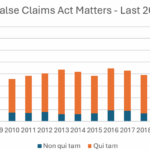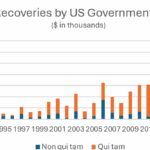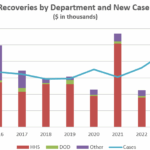By the Numbers: Trends in FY 2024 False Claims Act Recoveries

On January 15, 2025, the US Department of Justice (DOJ) announced that the government and whistleblowers took part in 558 False Claims Act (FCA) settlements and judgments with recoveries of more than $2.9 billion for the fiscal year (which ended September 30, 2024). This represents a 4.8 percent recovery dollar increase over the prior year. FCA recoveries total more than $78 billion since the law was significantly reformed in 1986.
“The Department’s enforcement of the False Claims Act this past year demonstrates its continued commitment to pursuing those who seek to defraud the American taxpayers,” said Principal Deputy Associate Attorney General Benjamin C. Mizer. “The False Claims Act and its whistleblower provisions remain a critical tool in protecting the public fisc and ensuring that taxpayer funds serve the purposes for which they were intended.”[1]
BRG analyzed the latest FCA statistics to identify where enforcement efforts are focused, including from a historic emphasis on healthcare to new developments in cybersecurity, along with key recoveries in the aerospace and defense industry.
Fighting Fraud with the FCA
Principal Deputy Assistant Attorney General Brian Boynton, head of the DOJ’s Civil Division, emphasized the importance of the FCA: “The Department places a high priority on fighting fraud and abuse in federal programs. The results announced today highlight once again that such conduct will not be tolerated, and that those who knowingly misuse taxpayer funds will be held accountable.”
The FCA imposes penalties and treble damages on those who knowingly and falsely claim money from or fail to pay money owed to the US government. Importantly, the FCA allows for qui tam actions—where whistleblowers file lawsuits on behalf of the government and receive a portion of the recovery. These key factors help explain the surge in both FCA claims and recoveries over the last two decades.
The DOJ reiterated its commitment to use the FCA to deter and address fraud by individuals as well as corporate entities.
Expanded Enforcement Effort
Enforcement expanded in FY 2024 with 1,402 new matters, a 15.1 percent increase from the prior fiscal year. Among those new matters, whistleblowers filed 979 qui tam lawsuits, the highest number in a single year ever. FY 2024 also saw 558 settlements and judgments, a slight decrease from 566 the previous year . Over the last ten years, new matters have increased by an average of 6.2 percent annually and have particularly accelerated in recent years, with an annual increase of 20.2 percent since FY 2021.

Since the modern FCA law came into effect in 1986, the median annual increase in recoveries has been 18 percent. Notable spikes occurred because of mortgage fraud between 2009 and 2014 following the Great Financial Crisis and in FY 2021 due to outsized recoveries in healthcare settlements with opioid manufacturers .

Sector Trends in FCA Recoveries
The DOJ typically categorizes and reports its FCA fraud statistics in healthcare, military procurement, pandemic, and cybersecurity sectors.[2]
While contributions to recoveries from different sectors have varied and new sources have emerged over time (e.g., pandemic-related fraud), healthcare-related recoveries have usually led the way since the 1986 FCA reform. Over the most recent ten years, healthcare-related recoveries have averaged almost three-quarters of all recoveries (73.4 percent) and over one-half (56.2 percent) of new matters.

Healthcare
With $1.67 billion, healthcare continued to represent the bulk of the $2.9 billion in total recoveries in FY 2024. Prominent subcategories of healthcare fraud constituting major FCA recoveries related to the opioid pandemic, unnecessary services and substandard care, Medicare Advantage matters, unlawful kickbacks, and Stark Law violations.
DOD Procurement and Notable Examples
While relatively less than healthcare recoveries, FCA enforcement in the DOD procurement sector remains a major force for preventing fraud, with an average annual recovery of more than $192 million over the last ten years.
A noted DOD case in FY 2024 includes Sikorsky Support Services Inc and Derco Aerospace Inc., which together paid $70 million to resolve allegations of overcharges for spare aircraft parts and maintenance and repair services sold to the US Navy to maintain the primary aircraft used to train naval aviators.
Allegations of overcharging made against corporate entities are not the only way government contractors can draw FCA scrutiny. In one matter involving Insect Shield LLC and the Estate of Richard Lane, Insect Shield’s majority owner, the government alleged false claims to the Department of Defense under contracts to provide Army Combat Uniforms. Specifically, the government alleged Insect Shield and Lane falsified the results of insect repellant testing to conceal failing test results relating to the uniforms it sold to the US Army.
Pandemic and Cyber Fraud
Fraud stemming from pandemic-related programs (including the Paycheck Protection Program (PPP) and Medicare services for COVID-19 testing) continued to grow in FY 2024, with 250 FCA settlements and judgments totaling more than $250 million.[3]
Specific fraud-related false claims involved PPP loan forgiveness, loan guarantees, and processing fees paid to the Small Business Administration (SBA), the administrator of the PPP program. Other matters related to COVID-19 testing fraud included allegations of offenders paying sales commissions to representatives recommending unnecessary medical testing unrelated to COVID-19, as well as forging of physician signatures. Another pandemic matter involved allegations of COVID-19 testing without adequate vetting of patients’ insurance coverage status prior to submitting claims for reimbursement.
Avoiding the FCA Spotlight
With settlements and judgments on a steady rise, companies in the federal government’s orbit should ensure they follow best practices to avoid enforcement actions under the FCA. From implementing effective documentation and training to ensuring correct fraud prevention policies and whistleblower procedures are in place, taking proactive steps now can prevent costly remedies in the future.
[1] DOJ, “False Claims Act Settlements and Judgments Exceed $2.9B in Fiscal Year 2024,” press release (January 15, 2025). https://www.justice.gov/archives/opa/pr/false-claims-act-settlements-and-judgments-exceed-29b-fiscal-year-2024
[2] Pandemic and cybersecurity fraud statistics are reported as “Other” in the financial statistics accompanying the January 15, 2025, DOJ FCA press release.
[3] The DOJ includes Pandemic and Cyber Fraud statistics among its “Other” sector category.
BRG’s Government Contracts Advisory Services (GCAS) group is a leading provider of consulting services to government contractors in the defense, construction, engineering, healthcare/health insurance, higher education, nonprofit, manufacturing, technology, hospitality and retail industries.
The Regulatory Round-Up highlights the latest news, regulations, and impactful updates that could impact clients and businesses, along with regulatory considerations, industry best practices, relevant audits and reviews, and upcoming industry events.
Related Services
Related Industries


Prepare for what's next.
ThinkSet magazine, a BRG publication, provides nuanced, multifaceted thinking and expert guidance that help today’s business leaders adopt a more strategic, long-term mindset to prepare for what’s next.